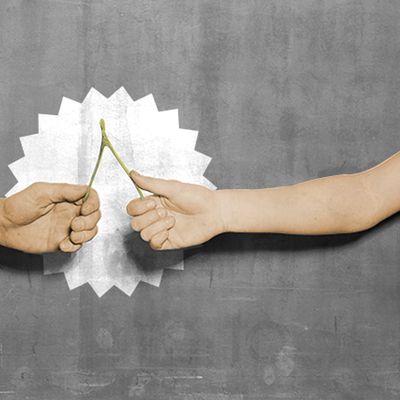
On Sunday, Liz Cheney, who’s running for the Republican Senate nomination in Wyoming, told Fox News that she doesn’t support gay marriage. This was understandably hurtful to her sister Mary Cheney, and to Mary’s wife, Heather Poe: Nothing like having your sister delegitimize your relationship on national television to really escalate the family tension. Mary and Heather took to Facebook to call Liz’s comments offensive. Their parents sided with Liz. Ouch.
I’ve watched the Cheney family feud with a certain level of personal investment. Prior to this very public blow-up, the Cheneys claimed that their political disagreements didn’t weaken their familial bond — love the sister, hate the sin. As someone who loves her family but loathes many of their beliefs, this hands-off approach is a survival technique that I’ve employed for years. They worry taxes are too high; I support policies that would make Scandinavians blush. We don’t talk about it. I’m a fervent supporter of abortion rights; they are donors to the Dubuque County Right to Life. We don’t talk about it. We probably had our last meaningful political debate when I was a teenager and my dad dragged me with him to see a speech by his favorite columnist, George Will; I was a subscriber to The Nation. (We do agree that American party politics can be exasperating: The Democrats don’t accurately represent my progressive values; the Republicans are insufficiently conservative for them.)
But the political inevitably gets personal, and even the most polite families can run into trouble. I’m not a Cheney-style politician, but my politics are important to me — and to the work that I do. Sometimes it seems impossible to maintain an authentic relationship with my family when, if we venture into any sort of meaningful conversation about the news, things get testy. Mercifully, my parents aren’t on Facebook. My dad has stopped forwarding me conservative chain e-mails. And we live thousands of miles apart, so when we’re together in person for visits or holidays, we’ve learned to steer clear of all vaguely political conversation. This year, it won’t be an issue. I’m not going home for Thanksgiving.
“Does it make you sad that we have such different beliefs?” I asked my mom over the phone this week.
“Some things upset me,” she said. “Other things I’m okay with. I guess it depends on the topic. It’s not gonna surprise you that I believe abortion is wrong. Life is precious.” I feel my blood pressure start to rise. It’s at this point that I have to remind myself that I am a reporter who is interviewing my mother for an article, not her opponent in a debate about the real-world effect of banning abortion. I don’t interrupt to point out that I also believe life is precious, which is why I don’t want to impose the sorts of abortion restrictions her fellow Catholic Antonin Scalia just allowed to take effect in Texas — restrictions that will do more to put poor women in harm’s way than to save first-trimester fetuses.
I say none of this. I take a deep breath instead. She continues, “Does it upset me that you don’t have that same feeling? Yes, but you’re entitled to your own opinion, just like everyone else.”
This live-and-let-live attitude has served us well for more than a decade, although we did learn tolerance the hard way. Unlike the vast majority of teenagers, who tend to agree with their parents’ outlook on politics, I was a burgeoning liberal atheist in a conservative Catholic household. I measured my political progress by the distance I created between my beliefs and theirs, and our fights were explosive. These days, I spend more time thinking about how to stay close to my family when our worldviews — political, religious, cultural — remain so far apart.
My mom thinks we have more in common than not. “I guess I align more with the conservative side, but it’s not like I’m cracked up about everything they do, either,” she told me on the phone. “I believe in gay marriage.”
“You do?!” I replied incredulously. Gay rights were one of those topics I’d studiously avoided for years, assuming my parents, like the Cheneys, didn’t hate gay people, but sided with the church in deeming same-sex relationships unworthy of recognition.
“I think God created them, and that’s how they are, and they have to be true to themselves,” my mom continued. I was shocked. Maybe we aren’t the Cheneys, after all! I’ve always been jealous of friends who were raised by parents who read The New Yorker and had art-museum memberships and voted for liberal Democrats. But I’ve also long suspected that my beliefs wouldn’t have the same amount of fire behind them if I hadn’t forged them in contrast to those of my family.
“The bottom line is I’m glad you think for yourself,” my mom said with discernible pride in her voice. “I think it’s better for you to have an opinion on your own, one that you’ve come to based on your feelings and beliefs and what drives you.” And now I’m a little bit sad I won’t be going home for Thanksgiving.




